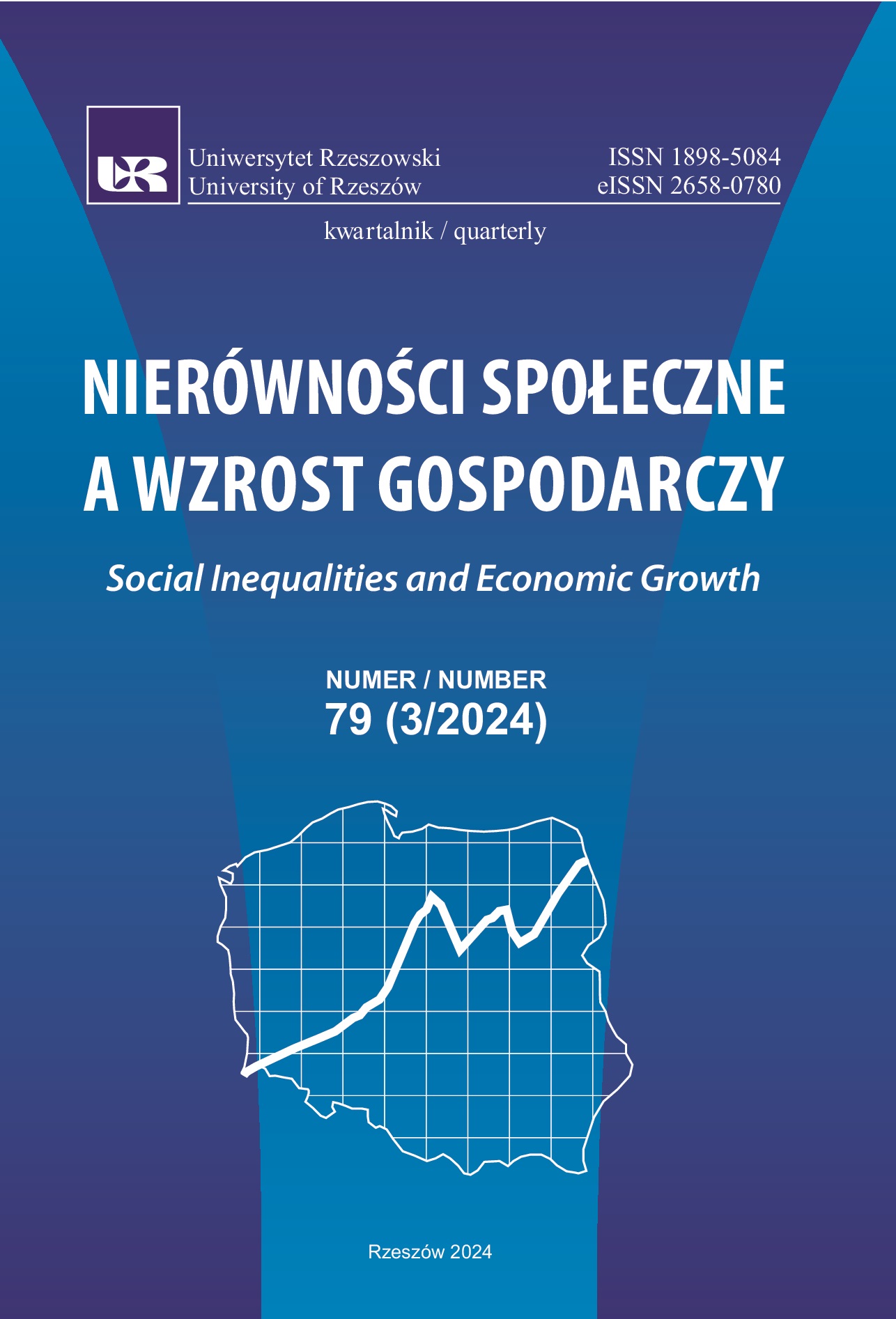Impact of regulation on investment crowdfunding
DOI:
https://doi.org/10.15584/nsawg.2024.3.7Keywords:
equity crowdfunding, alternative finance, regulation, financial innovationAbstract
This article focuses on the regulation of investment crowdfunding as a key criterion for the dynamic but safe development of this form of business financing. The aim of this article is to analyse the existing regulatory framework in developed market economies, such as the UK and the US, which are the leaders in the alternative finance market, and to try to assess whether the pan-European equity crowdfunding regulations that are being introduced have a chance of enabling the European equity crowdfunding market to emerge. Crowdfunding, and in particular investment crowdfunding, is a relatively new form of alternative financing for business activities, which can and – in its mature form – does provide an important source of funding that ‘fills the gap’ in early-stage financing for start-ups, innovative projects and is also a source of financing for SMEs. The intensive, uncontrolled development of innovation in financial markets generally leads to irregularities (fraud, abuse, and crises). In turn, excessive and restrictive regulation can act as a brake on the development of financial innovation. Until 2023, crowdfunding in EU countries will be regulated only by national laws, most of which are not specific to this form of financing. The fragmentation of the European market and the inconsistency of regulations have led to a slowdown in the development of this form of financing, resulting in a loss of development potential for companies and entire economies. The authors present the equity crowdfunding regulations of the US and the UK – the world’s number 1 and 2 crowdfunding markets – as a benchmark for the proposed pan-European regulations. The features of the common European rules seem to meet the requirements. And the increase of the funding amount to EUR 5 million opens up completely new possibilities for equity crowdfunding.
Downloads
References
Avgouleas, E. (2014). Regulating Financial Innovation: A Multifaceted Challenge to Financial Stability, Consumer Protection, and Growth. (Accepted Papers Series). University of Edinburgh, School of Law, Working Papers. Pobrane z: http://papers.ssrn. com/sol3/papers.cfm?abstract_id=2458335 (2023.09.01).
Bajakić, I., Božina Beroš, M., Grdović Gnip, A. (2021). Regulating crowdfunding in the EU – same rules, same results? Case study of Croatia. Balkan Social Science Review, 17, 7–24. DOI: 10.46763/BSSR2117007b.
Campbell, J.Y., Howell, E., Jackson, B., Madrian, C., Tufano, P. (2011). Consumer Financial Protection. Journal of Economic Perspectives, 25(1), 91–114. DOI: 10.1257/ jep.25.1.91.
Crowdfunding regulation in the European Union. July 20, 2023. Retrieved from: https://blog.crowdestate.eu/en/crowdfunding-regulation-in-the-european-union/ (2023.10.15).
Cumming, D., Hornuf, L. (2018). The economics of crowdfunding: Startups, portals and investor behavior. Cham: Palgrave Macmillan, Springer Nature. DOI: 10.1007/978-3-319-66119-3.
Deloitte (2021). Deloitte Colsulting LLP, The Usaid Economic Governance Program Equity Crowdfunding Regulation – Innovation Reform. Retrieved from: https://pdf.usaid.gov/pdf_docs/PA00ZMF8.pdf (2023.10.20).
ECUK. (2015). Equity Crowdfunding in the UK: Evidence from the Equity Tracker, Research Report, Department for Business, Innovation and Skills. Retrieved from: https://www.british-business-bank.co.uk/wp-content/uploads/2015/03/230315-Equity-crowdfunding-report-final.pdf (2023.10.20).
Estrin, S., Gozman, D., Khavul, S. (2018). The evolution and adoption of equity crowd¬funding: entrepreneur and investor entry into a new market. Small Business Economics, 51, 425–439. DOI: 10.1007/s11187-018-0009-5.
EU. (2020). Regulation (EU) 2020/1503 of the European Parliament and of the Council of 7 October 2020 on European crowdfunding service providers for business, and amending Regulation (EU) 2017/1129 and Directive (EU) 2019/1937. Retrieved from: https://eur-lex.europa.eu/legal-content/EN/TXT/?toc=OJ%3AL%3A2020%3A347%3ATOC&uri=uriserv%3AOJ.L_.2020.347.01.0001.01.ENG (2023.10.20).
European Commission (2018). FinTech Action plan: For a more competitive and innovative European financial sector, COM(2018) 109 final, 2018. Retrieved from: https://eur-lex.europa.eu/resource.html?uri=cellar:6793c578-22e6-11e8-ac73-01aa75e-d71a1.0001.02/DOC_1&format=PDF (2023.10.20).
Klimontowicz, M., Harasim, J. (2015). Tendencje rozwojowe na rynku alternatywnych instrumentów finansowych. Annales Universitatis Mariae Curie-Skłodowska. Sectio H, Oeconomia, 49(4), 227–235. DOI: 10.17951/h.2015.49.4.227.
Kordela, D. (2016). Crowdfunding udziałowy w Stanach Zjednoczonych. Annales Universitatis Mariae Curie-Skłodowska. Sectio H. Oeconomia, 50(4), 237–244. DOI: 10.17951/h.2016.50.4.237.
Michalopoulos, S., Laeven, L., Levine, R. (2009). Financial Innovation and Endogenous Growth. Journal of Financial Intermediation, 24(1), 1–24. DOI: 10.1016/j.jfi.2014.04.001.
OECD (2010). Policy Framework for Effective and Efficient Financial Regulation, OECD Recommendations and Principles, OECD 2010. Retrieved from: https://www.oecd.org/daf/fin/financial-markets/44187223.pdf (2023.10.12).
Raghavendra Rau, P. (2020). Law, Trust, and the Development of Crowdfunding (July 1, 2020). Retrieved from: https://ssrn.com/abstract=2989056 (2023.09.18).
Report Equity Crowd Expert (2020). Retrieved from: http://equitycrowdexpert.com/Reports.html (2023.10.27).
von Hippel, E. (2005). Democratizing Innovation. MIT Press, Cambridge, MA, April 2005. Retrieved from: SSRN: https://ssrn.com/abstract=712763 (2023.09.25).
Vu, A.N., Christian, J. (2023). UK Equity Crowdfunding Success: The Impact of Competition, Brexit and Covid-19. British Journal Management, 35(1), 321–344. DOI: 10.1111/1467-8551.12714.
World Bank (2019). World Bank & Cambridge Centre for Alternative Finance, 2019. “Regulating Alternative Finance” World Bank Publications – Reports 32592, The World Bank Group. Retrieved from: https://documents1.worldbank.org/curated/en/266801571428246032/pdf/Regulating-Alternative-Finance-Results-from-a-Global-Regulatory-Survey.pdf (2024.03.04).
WWW1. Retrieved from: https://www.alliedmarketresearch.com/crowdfunding-market-A47387 (2023.10.15).
WWW2. Retrieved from: https://www.crowdcube.com/explore/investor-categories (2023.10.15).
WWW3. Retrieved from: https://www.crowdfundinsider.com/2019/04/146414-uk-crowdfunding-association-schedules-meeting-with-fca-to-discuss-concerns-over-quality-of-supervision/ (2023.10.15).
WWW4. Retrieved from: https://www.sec.gov/info/smallbus/secg/rccomplianceguide-051316 (2023.10.15).
Ziegler, T., Shneor, R., Wenzlaff, K., Suresh, K., Paes, de Camargo, F.F., Mammadova, L., Wanga, Ch., Kekre, N., Mutinda, S., Wang, B., López Closs, C., Zheng Zhang, B., Forbes, H., Soki, E., Alam, N., Knaup, C. (2020). The 2nd Global Alternative Finance Market Benchmarking Report (June 30, 2021). Cambridge, UK: Cambridge Centre for Alternative Finance. Retrieved from: https://ssrn.com/abstract=3878065 (2023.10.20).
Downloads
Published
How to Cite
Issue
Section
License
Copyright (c) 2024 University of Rzeszow

This work is licensed under a Creative Commons Attribution-NonCommercial-NoDerivatives 4.0 International License.


